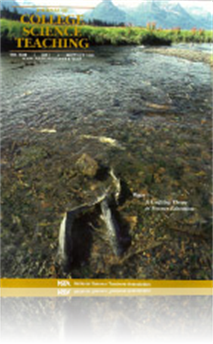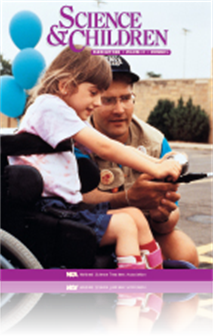All Resources
Journal Article
In over 18 years of operation, the Michigan State University’s “Spartan Speakers Program” has provided over 346 quality seminars, discussions, a...
Journal Article
Guest Editorial: In Search of Science for All
An opinion piece about the issue of inclusion in the elementary science classroom....
Journal Article
This article describes a new teaching strategy employed in a senior-level microbiology course where up to 25 students are introduced to and conduct se...
Journal Article
Using the inquiry method, nonscience majors in Portland State University’s Natural Science Inquiry classes complete student-directed projects, indiv...
Journal Article
Fresh water is one of our most important resources, yet 97 percent of Earth’s water is salt water and an additional 2 percent is frozen in glaciers ...
Journal Article
The phenomenon of complementation is not only one of the most important, but it is also one of the most challenging concepts for undergraduate genetic...
Journal Article
Editor's Roundtable: Drawing conclusions
Science Scope’s editor shares thoughts regarding the current issue....
Journal Article
Out of Sight: Investigating Unseen Objects
In this module, students measure and map unseen objects hidden within boxes representing the ocean floor. These instructional activities use the eleme...
Journal Article
What Research Says: What Have Researchers Been Saying About Science Fairs?
To help stimulate more interest in science fairs, this article offers a brief history and rationale of the science fair, discusses the research that h...
Journal Article
In clinical laboratories, molecular methods of DNA analysis such as the polymerase chain reaction (PCR) are used to identify fungal and bacterial path...
Journal Article
May is American Wetlands Month—an opportunity to leave the classroom and excite students with guided hands-on experiences in nature. In this article...
Journal Article
Frances Hamerstrom: Wildlife Biologist
The main purpose of this article is to provide a series of science lessons geared around the work and life of wildlife biologist Frances Hamerstrom. T...
Journal Article
Productive Questions: Tools for Supporting Constructivist Learning
The six types of productive questions—attention-focusing, measuring and counting, comparison, action, problem-posing, and reasoning—enable teacher...
Journal Article
The aim of this study is to determine what students' conceptions of a chemical are as they graduate with degrees in chemistry. With the knowledge of w...







